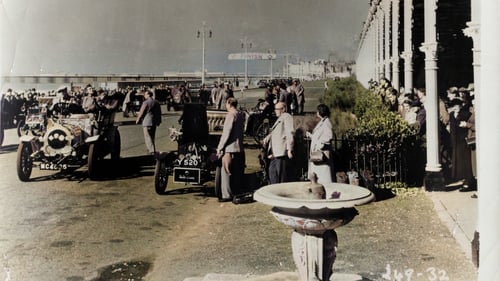
Newsreels from the '30s constitute the bulk of this fascinating documentary, clearly illustrating that the public was fed an extremely biased view of events: straight propaganda, the stricture to provide entertainment, and the attempt to be objective all contributing to this. Lewis and producer Elizabeth Taylor-Mead have constructed their argument well, but it is Jonathan Dimbleby's brief comments towards the end that contain the crucial lesson: forty years on, the same forces work to distort our view of Northern Ireland. The film only indicates this to be the case, but it is precise and coherent enough to make the point with considerable force.

Narrator
Documentary featuring aircraft from the 1953 Farnborough Airshow.

Himself, Newsreel Commentator
Two friends driving in the London to Brighton vintage car rally bet on which of them will be the first to arrive back home.

Jack Donovan
The story of a husband's implication in his wife's death, his stupid disposal of her body and the police enquiry which almost embroils him in a murder charge.

Narrator
Highlights from the Farnborough Airshow of 1952.

Account of the French expedition to the Himalayan peak of Nanda Devi in 1951; includes shots of the relief expedition led by Sherpa Tensing and some Hindu ceremonies.

Narrator
Highlights from the 1949 Farnborough Air Show.

Narrator
Brief summary of the Berlin airlift taken from newsreel material.

Visit to concentration camps.

Himself
Propaganda short showing how London is coping with World War II.

B.B.C. Interviewer
A professor teaching at a correspondence school discovers that a Nazi agent is trying to prevent a trade treaty being signed between England and South America.

Commentator (voice)
A look at the facilities and character of Oxford University, and the varied experiences that are associated with studying there.

Himself - Commentator
'Royal Road' takes a look at both the public-facing activities of King George VI and Queen Elizabeth (the Queen Mother) during the Second World War, as well as a showing a glimpse of the royal family's private life in the gardens at Windsor.

Voiceover/Narration
A 1940 black and white film, production sponsored by the Colonial Empire Marketing Board. 'The East African colonies are introduced as representative examples of the Colonial Empire. A tribal dance hints at the "life of fear and uncertainty" replaced by British rule, a village's "squalor" the need for continued war on "ignorance, poverty and disease." "Much can be achieved by money and the initiative of the White Man:" film hints at hydro-electric schemes, modern harbours (Mombasa), roads, bridges etc and illustrates in more detail hospital expansion; tsetse fly research and control; relieving malnutrition; agricultural improvement; education (primary school; Makerere College)." - Abridged version of synopsis on colonialfilm.org

Self - Narrator
In this film, specially taken for the BBC, viewers are given an idea of the growth of the television installation at Alexandra Palace and an insight into production routine. There will be many shots behind the scenes. One sequence, for instance, will show Adele Dixon as she appears to viewers in the Variety at 3.30 this afternoon, and will then reveal the technical staff and equipment in the studio that made this transmission possible.

Woolrich
Wealthy businessman F.X. Benedik, Head of the Rynox company, claims to have been receiving threats from a mysterious stranger named Boswell Marsh. Benedik is subsequently found murdered and the hunt is on for the elusive Marsh. Benedik's son Tony takes over the running of the business and tries to find some lead on Marsh, and why he should have borne a murderous grudge against Benedik Senior. His investigations lead him to the unexpected finding that Marsh never existed.

Party Guest
A woman believes her boyfriend died in the First World War, but he is now looking for her









